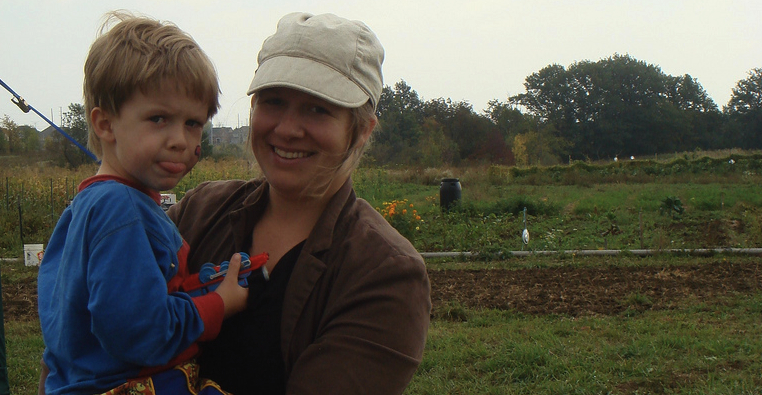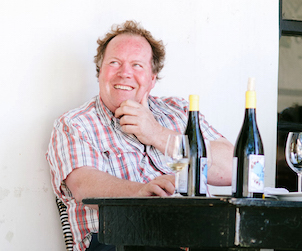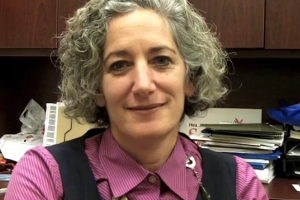by Malcolm Jolley

Christie Young and son at FarmStart's McVean Incubator Farm in Brampton. Photo: Laura Berman / greenfusestock.com.
“There are people who are meant to be farmers,” Christie Young says, “who didn’t grow up on farms.” Young, was explaining to me the problem that she and her team at FarmStart, the not for profit she founded and serves as Executive Director, try to solve every day. Most farmers grew up on farms, but what if you grew up in the city? Or came to Canada as an immigrant? How do you become a farmer then? Or even just try it out to see if it’s right for you? Since, as Young pointed out, 75% of Canadian farmers will reach the age of retirement in the next decade or so, these questions are more pressing than one might think. Especially, since there is no “real training for artisan farming”. On a recent visit to FarmStart’s hometown, Guelph, Young sat with me and told me how her organisation is lending a hand to a new generation of Ontario farmers.
For Young, conserving prime farmland is not enough: there needs to be skilled farmers to work the land, and in a way that’s healthy and sustainable. To that end FarmStart provides would be farmers with three vital things: 1) access to land, 2) access to capital, and 3) training and mentorship. FarmStart helps new farmers get access to land by operating the McVean Incubator Farm on 50 acres of Toronto and Region Conservation Authority land in suburban Brampton, as well as through a network of over 700 landowners who are willing to lease or lend small parcels of land that new farmers can experiment and start new businesses on. (A directory of farms and a way for landowners to sign-up is hosted at by an organisation that FarmStart began and spun off called FarmLINK at farmlink.net.) Help with capital, Young explained, is financial but also, and “maybe more importantly, social”. Farming can be an isolating experience, and much of FarmStart’s mandate is to connect would-be and newbie farmers, so they can compare notes and offer advice as they move through the three year program and beyond. Young sees this as equally important than the vocational training the FarmStart network also provides.

FarmStart's McVean Incubator Farmers in September 2010 demonstrate the diversity of people attracted to farming. Photo: Laura Berman / greenfusestock.com
In exchange for the help, FarmStart asks its participants to adhere to its three tenets: 1) that the new farmers take care of their soil so that it remains productive for future generations, 2) that they absolutely minimise “off-farm” inputs (like industrial fertiliser as opposed to “on-farm” inputs like compost), and 3) that they farm in a way that minimizes the use of fossil fuels. The point, Young explained, is that this new generation of farmers will leave a soil and climate that future generations may also use to grow healthy food.
Even with this help, Young admits, about half of the participants in FarmStart’s programs will drop out, for personal or business reasons, over the course of a decade. “If they are not entrepreneurial, then they can’t be farmers,” she said, “we do not hand hold or spoon feed.”
Young is working furiously now to secure new farmland (there is a waiting list to join FarmStart as it is) and raising money to bring more new farmers into the program, including an annual end-of-summer fundraiser at the McVean Farm called Harvest Table. But for all these challenges, Young is beginning to see Farmstart’s efforts pay-off. She points to Matchbox Garden & Seed Co. and Green Being Farm as to shining examples of successful graduates, who remain committed to FarmStart’s mentoring ethos. And Young says there is interest in expanding FarmStart’s programs to areas around Kingston, Peterborough and London, Ontario.
“What we want to do,” Young told me with a smile, “is make people realise that farming is a future.”
 Malcolm Jolley is a founding editor of Good Food Revolution and Executive Director ofGood Food Media, the non-profit organization that publishes GFR. Follow him at twitter.com/malcolmjolley. Photo: John Gundy.
Malcolm Jolley is a founding editor of Good Food Revolution and Executive Director ofGood Food Media, the non-profit organization that publishes GFR. Follow him at twitter.com/malcolmjolley. Photo: John Gundy.








